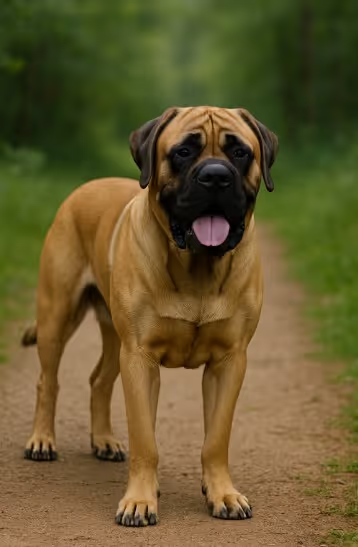The Mastiff, often referred to as the English Mastiff, is one of the largest and most powerful dog breeds in the world. Despite their imposing size, Mastiffs are known for their gentle temperament and deep loyalty to their family. They are calm, protective, and dignified, making them excellent companions for experienced dog owners with enough space and patience for this colossal breed.

Mastiffs have a long and storied history dating back thousands of years. They were used by ancient civilizations including the Babylonians and Romans for guarding, hunting large game, and even fighting in wars. In England, Mastiffs became popular estate guardians, with their sheer size acting as a powerful deterrent to intruders. The modern English Mastiff was refined in the 19th century and is now valued for its calm and affectionate disposition more than its guarding prowess.
The Mastiff’s sheer size is matched by a confident, stoic presence that commands respect without aggression.
Mastiffs are relatively low maintenance when it comes to grooming, but their size can make even basic tasks feel more involved.
Grooming Tips:
Despite their size, Mastiffs are surprisingly low-energy dogs that don’t require intense daily exercise.
Exercise Tips:
Without appropriate movement, they may become overweight and suffer joint issues.
Mastiffs are intelligent but independent and can be a bit stubborn, so training requires patience and positive reinforcement.
Training Insights:
With firm but gentle guidance, Mastiffs become reliable and respectful companions.
Feeding a Mastiff requires careful attention due to their size and predisposition to obesity and bloat.
Feeding Guidelines:
Supplements like glucosamine and omega-3s are often recommended to support joint health.
Due to their size and needs, responsible breeding and education are key.
Resources:
What to Ask Breeders:
Consider breed-specific rescues if you're open to adopting an adult dog.
Do Mastiffs make good family pets?
Yes, they are deeply loyal and gentle with children when properly socialized.
Are Mastiffs aggressive?
Not typically. They are protective but not naturally aggressive. Training is key to channeling their guarding instincts.
Do they drool?
Yes — especially after drinking water or eating. Keeping a towel nearby is recommended.
How much space does a Mastiff need?
Ideally, a home with a yard. They can adapt to apartment living only if there’s ample indoor space and access to daily walks.
Are they good with other dogs?
They can be, especially when socialized early, but their sheer size may intimidate other animals.